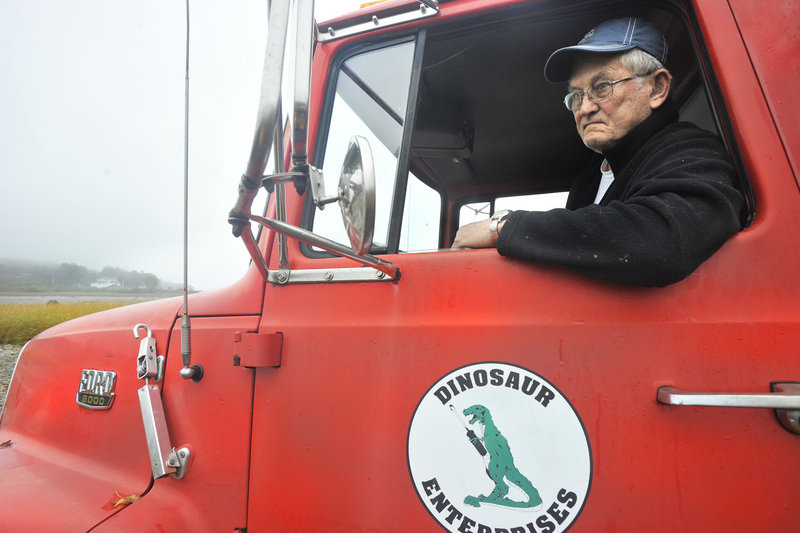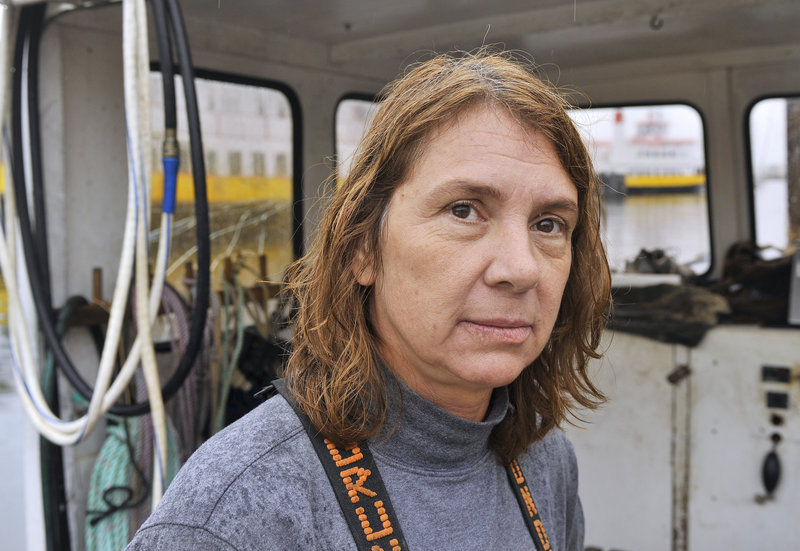GREAT DIAMOND ISLAND – On Memorial Day weekend, when all the summer people were arriving on the island to open their cottages, Ted Weber propped up a sign on the 300-gallon gasoline tank that has been parked on a trailer in front of his house for a quarter of a century.
“Closed for business,” it read. “A couple of unnamed persons pushed the city.”
If people asked Weber about the sign, he showed them a cease-and-desist order from Portland City Hall.
For many islanders, this was alarming news. Weber owns Dinosaur Enterprises, the island’s only supplier of kerosene, gasoline and home heating oil.
The sign’s purpose was political. Weber needed help persuading city officials to change the zoning so he could keep his fuel business open.
Here is Weber’s problem: The property where he parks two fuel trucks and his trailer for the gasoline tank is zoned for residential use, as is the rest of the island. The trucks are parked in the driveway of his home at 118 Sunset Ave.
The Casco Bay island, which is part of the city of Portland, served as a staging ground for the Atlantic fleet during World War II. Now, 75 people live here year-round, but the summer population swells to 1,800.
Weber also delivers fuel to the handful of homes on Little Diamond, driving his truck to the island over a sandbar that links the two islands at low tide.
Weber, 76, said he makes barely any money from the business, which he describes as a part-time retirement job that keeps him connected to the community and helps pay for the family’s annual vacation to Florida. He said he will close the business if the City Council rejects his request to change the zoning to allow commercial uses on the property.
Some islanders, however, believe that the business poses a safety risk and are urging the city to deny Weber’s request.
“I don’t feel that an oil and gas delivery system has a place in the middle of a residential zone,” said Tammy Robinson, who first complained to the city about the issue six years ago. She and her husband, Roger, a lobsterman, live a few houses away from Dinosaur Enterprises, which consists of Ted Weber, his wife, Betsy, and their daughter, Beth. The Robinsons have lived on the island year-round since the late 1970s.
Robinson said she has seen Weber’s truck get stuck on the sandbar while crossing over to Little Diamond Island. It was towed out before the tide swept over it, she said, but someday Weber won’t be so lucky, and heating oil or kerosene could end up in Casco Bay.
At least two other families also oppose Weber’s request for a zoning change, but only Robinson is willing to speak publicly. She said opponents are too intimidated to speak up because they worry that Weber — who has a monopoly on the fuel business on the island — could effectively leave his opponents in the cold by cutting off their service.
The way Robinson sees it, Weber’s monopoly allows him to charge whatever he wants. If Dinosaur Enterprises was closed down, she said, mainland fuel dealers would bring their trucks to the island on a barge. They don’t come here now because Weber has tied up the market so much that there are not enough customers to make it worth their while.
Right now, Weber charges $4.70 a gallon. The average cash price for home heating oil is $3.68 a gallon, according to a survey released last week by the Governor’s Energy Office.
After the Robinsons complained about Dinosaur Enterprises six years ago, Weber stopped delivering kerosene to them. Tammy Robinson said Ted Weber suggested to her that she might find cheaper fuel elsewhere. So Roger Robinson has been bringing kerosene from the mainland in 5-gallon cans on his lobster boat.
While other fuel companies might come to the island on occasion if Dinosaur closed, Weber said, the fuel would be more expensive. That’s because the fuel companies would have to pay the $300 barge fee for each way of the trip as well as the driver’s time riding the barge. Another problem: The barge can unload only at high tide, so fuel dealers would have to work around that. He said islanders might have to wait a couple of weeks for a delivery.
Weber gets his fuel from the fuel barge operated by Portland Harbor Fuel, which supplies fuel to fishing boats and ships in Casco Bay. The delivery cost is built into the fuel price, which is about $1 more per gallon than on the mainland, Weber said.
Weber’s business also helps homeowners in emergencies. “What happens when the furnace goes out in the morning in the dead of winter, like when we had the ice storm in 1998?” asked Beth Weber, who is a certified oil burner technician. “You are not going to have a fuel company out here to provide service.”
During the Ice Storm of 1998 — when a 3-inch layer of ice knocked out power for 360,000 customers in Maine, one-third of whom lost electricity for more than a week — Ted Weber worked in 12-hour shifts with volunteers to prevent the water lines of every house on the island from freezing, stringing electric cords from each house to the street to make it easier to plug in portable generators for a short time.
Weber, who grew up on Yarmouth’s Cousins Island before the bridge connected it to the mainland, said helping your neighbors is part of island life.
“It’s called islanders taking care of islanders,” he said. “If you like them or not, it doesn’t matter.”
The sign Weber put up on Memorial Day was taken down a few days later after a city attorney told the Webers that the business could stay open as long as they were working to resolve the zoning issue.
By that point, City Hall had been hit with a barrage of phone calls and emails from the Webers’ supporters. More than 200 people signed a petition urging the city to keep Dinosaur in business.
At a Planning Board workshop on Sept. 24 at City Hall, the Council Chamber and the balcony were packed with islanders who came to show their support for the Webers’ rezoning proposal. Tammy Robinson was the only one who spoke against it.
John Condon, the captain of the island’s volunteer fire department, told the Planning Board that Dinosaur is vital for protecting the safety of the public, and he noted that Ted Weber during a major house fire six years ago kept the fire trucks fueled through the night.
Beth Weber, addressing the Planning Board, turned around and looked at the crowd.
“Who here has been helped by Dinosaur?” she asked, and dozens of hands shot up in reply.
The Webers’ abutters said they supported the rezoning proposal, which would be in effect only for the Webers and could not be transferred to new owners.
In an interview on the island, Susan Sala, 73, a neighbor who can see the fuel trucks from her house, said that she sleeps better at night knowing that the Webers are right next door. The fuel trucks might not be pretty, she said, but they are important.
“It’s part of island life,” she said.
When she didn’t have enough money to pay her fuel bill, Katie Ford said, Ted Weber paid for the fuel himself and waited until she had the cash to pay him back.
“I’m sure he did this with everybody on the island,” said Ford, who helped circulate the petition. “He’s a sweetheart. We’d all be sunk without him.”
Impressed by the outpouring of support, planners seemed eager to help the Webers, who will need to comply with a number of conditions, such as filing a state Spill Prevention Control and Countermeasure Plan with the city, which the Webers said they would do.
The public hearing for the zoning change has not been scheduled. The City Council will have the final say.
Weber said he is optimistic. “It’s extremely gratifying to see, when the chips are down, the number of people who will stand up and rally around you,” he said.
Staff Writer Tom Bell can be contacted at 791-6369 or at:
tbell@pressherald.com
Copy the Story Link
Send questions/comments to the editors.





Success. Please wait for the page to reload. If the page does not reload within 5 seconds, please refresh the page.
Enter your email and password to access comments.
Hi, to comment on stories you must . This profile is in addition to your subscription and website login.
Already have a commenting profile? .
Invalid username/password.
Please check your email to confirm and complete your registration.
Only subscribers are eligible to post comments. Please subscribe or login first for digital access. Here’s why.
Use the form below to reset your password. When you've submitted your account email, we will send an email with a reset code.